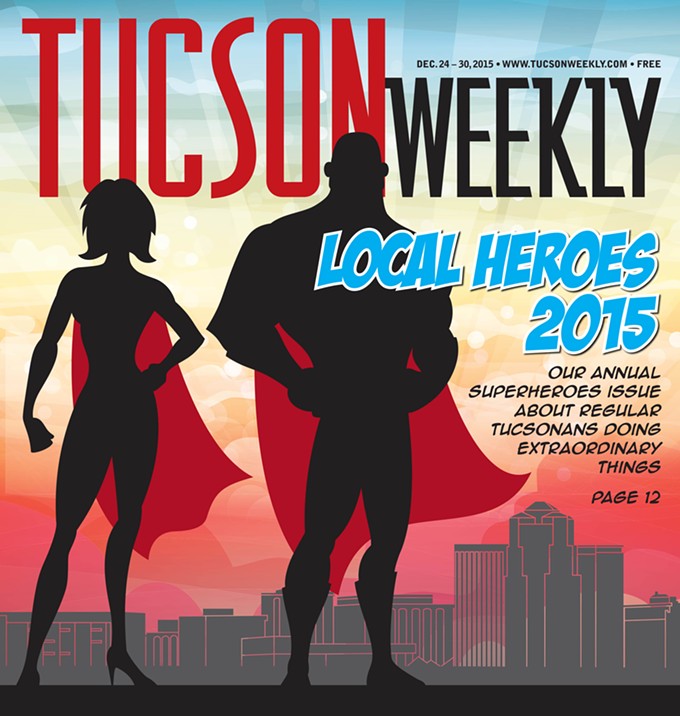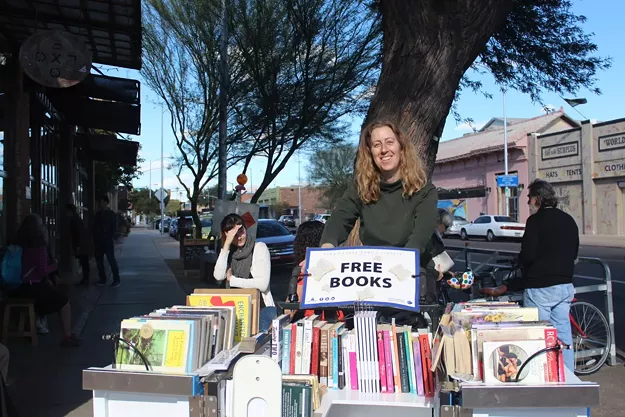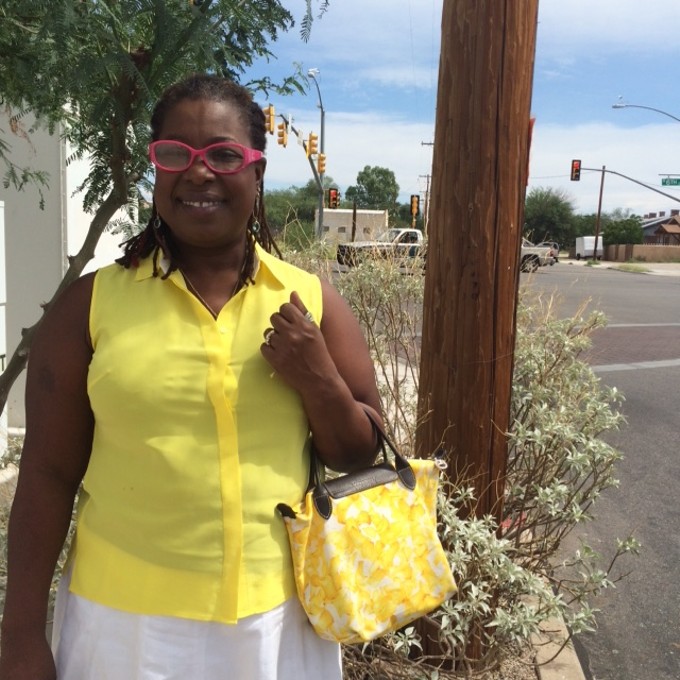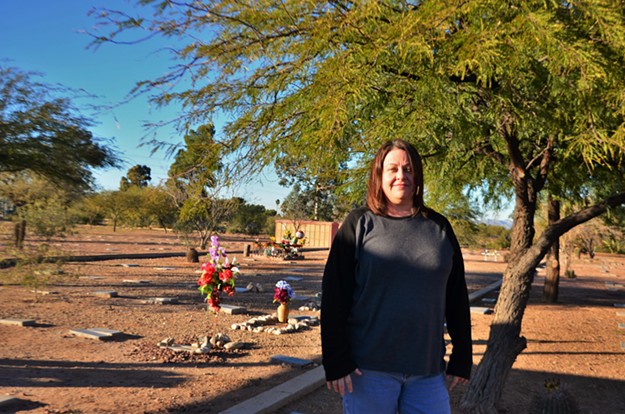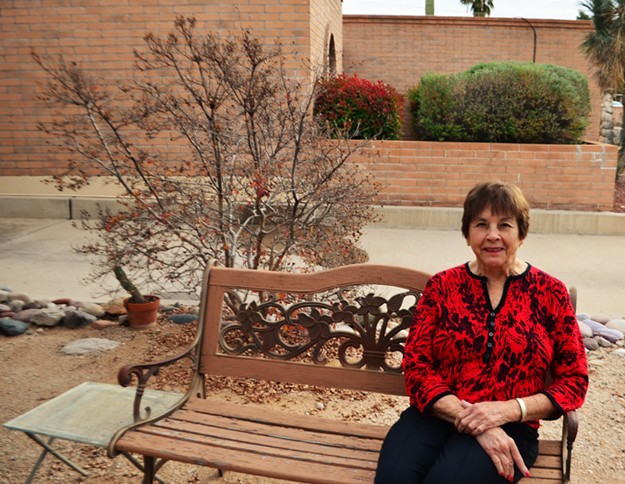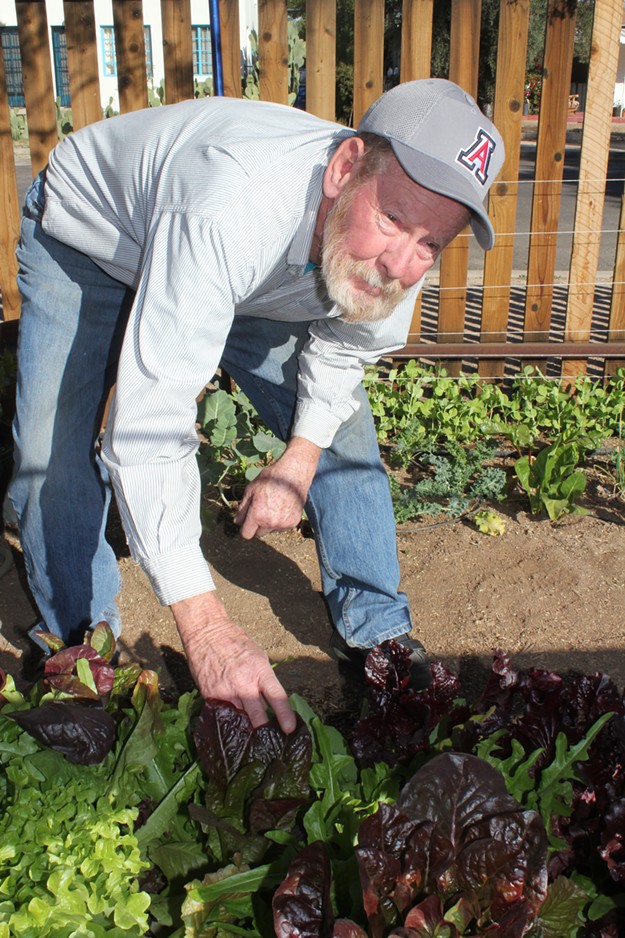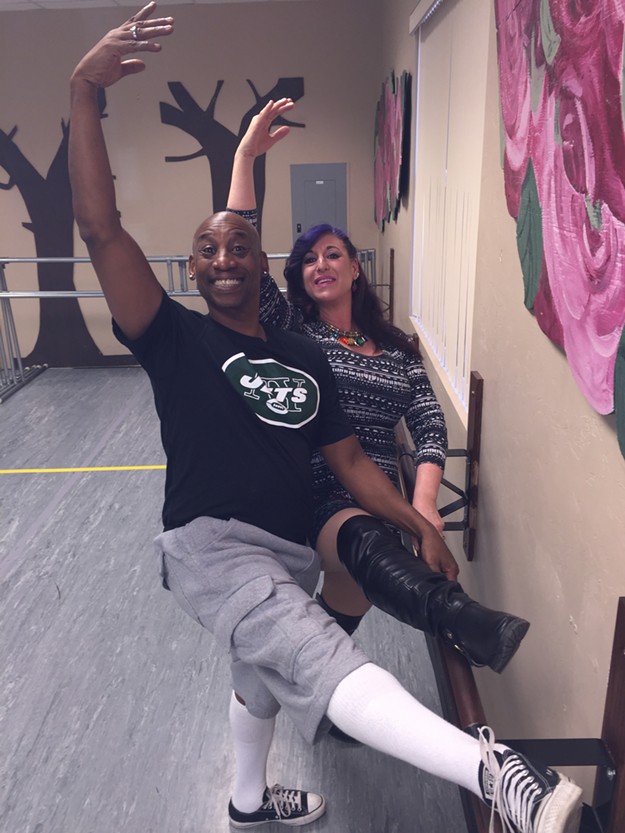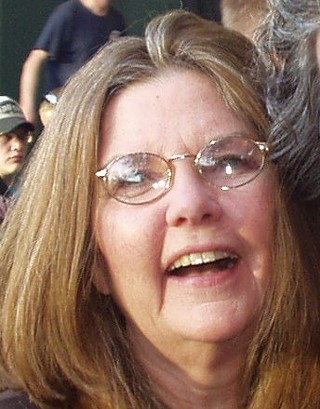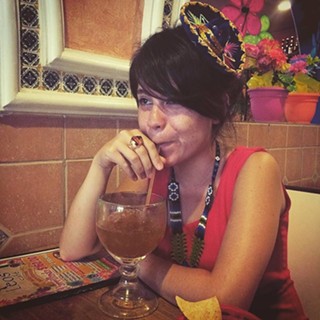Our 12th Local Heroes issue. This could be our last. Of course we said that last year, remarking that perhaps this is getting boring. Perhaps its time to move on to some other feel-good idea to carry us through the holidays. However, reading the heroes picked by staff and contributors, there are people in this issue you should know about and they should be recognized for their contributions to the community.
Another year. Another Local Heroes issue. We hope it inspires you Tucson, and who knows, perhaps you’ll be featured in a future issue for doing good.
Karen Greene
It's a warm winter afternoon and inside downtown's Exo Roast Co, the sounds are just the occasional hiss of an espresso machine and the strumming of instrumental Brazilian music from an acoustic guitarist. Nearly every table is full, but there's little of the chatter you might normally hear in a bustling coffee shop.
Instead, people are burying their noses in books, drawing sketches or playing games.
This is Analog Hour, a new monthly tradition at Exo and its neighboring wine-and-beer bar, Tap & Bottle.
In just a few months after its debut, Analog Hour is a hit: The third Sunday of every month, the two cafes fill up with readers seeking a communal spot to crack open their hardcovers for a few hours of old-fashioned reading.
Analog Hour is the latest brainchild of Pima County librarian Karen Greene, who is out on the sidewalks with one of the library's three new book bikes, ready to hand out a free used book to anyone who wants one. She's thrilled to see Analog Hour taking off.
"My heart still kind of pitter-patters when I look and see that both bars are filled with people reading or people talking quietly so they didn't bother the people sitting nearby who are reading," Greene says.
And so far, she hasn't had to shush anyone, even though one week the bar did get a little noisy. "I went in and it was kind of loud and I did feel the need to shush, but I didn't," she remembers. "I kept that inside."
She readily admits to stealing the idea for Analog Hour after hearing about sessions in Seattle and Brooklyn.
"I'm a big copier," Greene says. "I tend to find ideas that I like and think, Tucson should do that."
Greene did the same thing for the library's three book bikes, sturdy cycles that resemble the bikes that paleta vendors use to keep their popsicles cold. But instead of a cooler on the front, there's a big wooden box that unfolds to reveal a treasury of books for the taking.
Greene first saw them being used in Chicago about four years ago. "I thought we should have it here and the library thankfully went along," she says.
Greene, who has worked as a librarian for more than two decades, has always been a big fan of the book. "I was told many times as a kid that I needed to go outside and play," she says.
When she was in her early 20s, a librarian helped her find an old childhood favorite after she described it to her and she decided that was what she wanted to do for a living.
Besides getting the wheels rolling on the book bike and launching Analog Hour, Greene helps manage a library program that takes books to homebound Tucsonans who can't get to the libraries, as well as a team of volunteers who are growing corn, okra and other fruits and vegetables outside the main library. The produce is available to anyone who wants to pick it, although Greene warns: "I highly suggest washing it off before eating it."
And in her spare time, Greene has organized a monthly adult spelling bee that is moving from Sky Bar over to Tap & Bottle next year.
Amy Rude, who owns Exo Roast Co with her husband, is thrilled to be working with Greene on Analog Hour.
"I love Karen's enthusiasm for literacy," Rude says. "It's not just about books, it's about engaging the public. It's about meeting people where they are. It doesn't have to be boring."
Rude's appreciation of Greene goes back to her days as a teacher before she opened Exo. She remembers sending Greene an email asking about a book recommendation that would challenge a particular student. Greene wrote back a long list of suggestions.
Greene says her big hope is that she'll find the right book for you.
"I want to match you up with a book that is going to make you so happy to be reading," she says.
—Jim Nintzel
Nanette Longchamp
Nanette Longchamp stands by her classroom door every morning, greeting her second graders in different languages at Rosemarie Rivera Elementary School. The latest addition to this morning ritual is "Sak passé," a French Creole version of "What's happening?"
Longchamp recently read a book to her class about Trombone Shorty, a young New Orleans jazz musician. "Now they added a morning greeting to me that Trombone Shorty used with his friend: 'Where y'at, Ms. Longchamp?' They immediately picked up on it and when we are singing, they use imaginary trombones," she says, adding that it makes her laugh. "Isn't that the way of love?"
Her love of teaching is contagious. "When you see how enthusiastic kids are about learning, it's amazing. I just wish we had more people going into teaching in Arizona," Longchamp says. With the present teacher shortage in the state, she understands that "it is about money."
Born in Haiti, Longchamp speaks French, French Creole, English and is working on Spanish. Her family moved to Brooklyn when she was 10. Longchamp is constantly trying to raise the sights of all of her students. "The most important thing I bring to the classroom is a positive attitude. I tell them it's okay to be wrong. In medicine, in law, we're always evolving and learning."
Taking that sentiment to heart in her 40s, while working in Internet communications, she pursued a post baccalaureate in education at the UA. Longchamp's interest in becoming a teacher began as a volunteer in her son Isaac's (now 17) kindergarten and first grade classrooms at Sam Hughes Elementary School.
"I loved watching the interaction between the teachers and kids. 'I can do that,'" she thought. At that time, "I was also writing stories about Haiti, going through a period of trying to fall back in love" with her birthplace.
Longchamp started teaching at Rivera Elementary in 2011, and has since taken to heart what one of her professors had advised, "It's not about giving kids what they deserve or what is fair, but making sure they get what they need." It worked for her. She was voted 2014-15 Star Teacher of the Year by Rivera teachers and staff.
In her classroom, students do a lot of writing. To model journal writing, Longchamp reads aloud her entries to students. "We don't tell family secrets," she quips, recalling her excitement as a child discovering details of a teacher's life.
Encouraging her students to think about their futures is high on her list. "I lecture them every week. Second grade is the foundation of the upper grades, for all later learning. I talk to them about college," she says, "telling them it's a great idea to be first in their families if no one ever went before."
At the beginning of the school year, when students arrive in her classroom, Longchamp begins her mode of instilling confidence.
Rivera Elementary is a Ben's Bells Kind Campus School, which fits her teaching philosophy. "I come into the classroom ready to teach. They come in ready to learn," she affirms, which supports an environment of mutual respect and compassionate behavior.
Longchamp advocates not only for her students but also for her fellow teachers, encouraging them to join the Sunnyside Educational Association. She's been the site representative at Rivera since 2014.
Within the community, there's often "a total disconnect between the perception of teachers' salaries and contracts, which aren't for 12 months but are for nine months," notes Longchamp. During the summer, teachers are often taking classes on their own dime, preparing lessons, and getting ready for the next school year.
"I've never met a teacher who doesn't love the profession. It's too bad the public and the politicians don't support us more," she says. "Teaching is absolutely a labor of love. How many times a day can you laugh inside because of what second graders say? I can't tell you the amount of joy I get."
—Sheila Wilensky
Michele Ream
Most days, you can find Michele Ream in a wash on the outskirts of downtown Tucson, a small patch of land outside a public park, or making phone call after phone call trying to get someone on Social Security—sticking her neck out for the community's homeless men and women, advocating for them to the local government and flawed homeless outreach organizations, as well as helping them navigate through a system that oftentimes sets them up for failure.
For more than one year now, Ream has also been spending a lot of time building a prototype for a project she co-created, Community Supported Shelter Tucson, which hopes to provide the homeless population with the option of sleeping and storing their possessions in wooden huts that can be placed at church parking lots, and other areas of the city, to not entirely rely on shelters that require an identification in exchange for a bed for the night.
"It is so hit or miss. [Organizations] have created all these barriers to keep the people that you say you are helping from accessing [the resources]," Ream says.
Social work is a path Ream says she never made a conscious decision to stick to, but one day she just found herself there.
"I guess I have always felt something inside that drives me to stand by those who are often judged harshly by society, and [are] seen as somehow [being] less than," she says. Ream does homeless outreach work at the Primavera Foundation, but much of her advocacy happens outside that position. "I guess there is also part of me that likes the challenge of navigating the maze of barriers that bureaucracies put before people ... that's not to say it isn't frustrating as fuck, but I feel if I don't speak up [for them] then who will?"
What drives her relationships with the people she comes face-to-face with—whether they are on the streets over addiction struggles or a mental illness—is the deep-hearted belief that, truly, none of us are immune to these issues; none of us are immune to extreme poverty and homelessness, and for that reason the men and women trying to get some rest on sidewalks, or the doorways of buildings downtown, deserve compassion, dignity and respect.
To her, true humane improvements begin with giving people solid options for temporary housing. Her first hut is almost complete, and Ream's next step is to present it to the City of Tucson's Planning and Zoning Department for feedback. She's already had conversations with several local churches that are interested.
With her other job as a realtor, Ream wants to make enough money to sustain and make her hut project grow.
"It is my hope that our community will come together to look at new and innovative ways to address housing and shelter options," she says. "All too often I hear people complaining that 'homeless folk turn down housing and shelter,' and assume that something is wrong with them. I will continue to publicly share the struggles and barriers that I encounter on a daily basis working with our homeless neighbors. And I'll continue to advocate for cost effective and genuine options that provide basic shelter, security and stability."
—María Inés Taracena
Arlene Oliver
Arlene Oliver may have missed her calling. A retired legal secretary, shopping has been her favorite girl-time sport. She knows all the stores and boutiques. Mix and match outfit coordination is in her DNA.
But she's even more passionate about helping others shop. Her particular gift is helping people with empty closets, or women who are self-conscious in stores, women who don't know their sizes, mostly women whose only impediment to having a job is something to wear. In short, her clients are women whose shopping is desperate to be cared about, and perhaps she's the perfect person for the job.
She has volunteered up to three days a week for the YWCA's Your Sister's Closet for the past 10 years. Women are referred to the closet by employment and social service agencies all over town. None have clothing appropriate for work, let alone nice enough for an interview.
Anyone who ever visited Mills Touché may feel some déjà vu upon entering Your Sister's Closet. An intimate shopping experience, intended for one client at a time, it's finished with walnut-stained, wall-size fixtures, shelves, cabinets and an entire room of racks for hangers. The shop was specifically designed to house Your Sister's Closet when the new YWCA building went up in 2007.
"We have this very nice reception area," Oliver says, "and we bring them in and sit them down and visit with them for a little bit. Tell them what we can do for them ... find out what their plans are." She doesn't pry, she says, but is happy to listen.
The goal is to be like a boutique experience. Women pick out things they like, and then come out of the dressing room in their first outfit; Oliver considers what other sizes and pieces might work and brings them for the client to try. Women leave with two or three shopping bags full of skirts, blouses, pants, shoes, bags, bras, and accessories, all coordinated to provide one confidence-building interview outfit, and enough other clothes for a full week's work.
Oliver spends one day a week sorting through donations and figuring out what else the shop should have on hand. She spends another day shopping and gathering donations. Through an arrangement with Twice As Nice, she is able to swap out good things the Closet can't use for sizes, especially large shoe sizes, that are in demand. Clothes and accessories come from all over, including upscale sources like J Jill and Brighton. Raytheon and others hold "clothes-raisers," and people sometimes ask their friends to donate clothes instead of bringing gifts for special occasions.
Oliver says, "When you stop working, all of a sudden you have a closet full of clothes you don't use." It was when she was ready to give hers away that she discovered the closet and committed to help. Former client Tonya Haymore says, "That people came and donated the specific idea of 'I'm going to help somebody get a job, it really made me feel ... wow ..."
— Linda Ray
Tom Harrison
The heroes who get the headlines are frequently the high-profile situations—the dramatic rescue of a driver trapped in raging flood waters or saving someone from a burning building—but there are other, more quiet heroes, who seek no acknowledgment while moving their communities forward.
Tom Harrison is one of those humble heroes who has unobtrusively made his contributions over the past couple of decades, and in the process, changed a number of lives for the better.
Harrison never got to complete his college degree, leaving the UA to take care of his terminally ill father. "I dropped out of school, got married, had two children, and never did get my degree."
But all the education he received in an agricultural curriculum didn't go to waste. Making his living as a contractor, he also started growing his own backyard garden vegetables and soon became the envy of other gardeners in the neighborhood.
Fast forward to the time his two children (Scott and Michelle) began school, and Tom, and wife, Joyce, got involved in helping children grow and learn. "One of us was always going into a school like Hudlow, Holladay, or Steele Elementary, as a den mother or den father," he says. "And we'd bring fresh garden produce with us to share with the children."
One day a teacher asked Tom if he'd like to try his hand building a school vegetable garden—that's the start of a new volunteer career that brings us to 2nd Street Children's School and what may ultimately be termed Harrison's Folly.
"My granddaughter, Reya, attends the school and her father had told them about my previous school garden history. They needed some guidance and structure on how to build and maintain a successful garden."
So Tom the contractor set to work tilling, fertilizing, irrigating and fencing a plot. Absorbing the cost of materials along with hours of his free labor, a fledgling garden survived its first year. Now in its second year, it is thriving. "It's a labor of love for me," he says. Most of the 60 children know his name and want to pick and eat the veggies on a daily basis.
"I feel good that I'm making a bit of a difference. Teachers don't have the time to do something like this, so any involvement on the part of parents and volunteers is welcomed. There are on-going challenges, but I'm happy with what has been created here," he says
So, too, is school director Jenny Douglas.
"Tom has turned a plot of uncultivated land into a gorgeous garden that all students get to participate in and learn from. He is so humble about what he has accomplished. He just shows up, creates this beauty, and doesn't seek recognition—but we want him to know he's very much appreciated," Douglas says.
Asked his takeaway at the end of a volunteer workday, he says: "A sore back."
—Lee Allen
Joey Rodgers
A couple of years ago, I sat in the audience of Dancing in the Streets' Nutcracker production. There was something different from the beginning of the holiday show that stuck out—this was a dance school that made a place for everyone. In the midst of the Nutcracker dances were several dancers who some physical limitations, who also happened to have huge smiles on their faces like every other dancer on the stage. The show was seamless, and I left feeling like this was a dance school worth supporting because of the very fact that it made a place for special-needs dancers that other schools and programs might reject.
Sitting in the South Tucson dance studio with founder Joey Rodgers and his wife, Soleste Lupu, I discover that nothing has changed and that some of those dancers remain in the school.
Rodgers, who grew up in Tucson's South Park neighborhood, opened the school in 2008 with the idea of reaching out to students like him. Life wasn't always easy for Rodgers, but once ballet entered the picture, it certainly saved his butt.
Before leaving Tucson to start his career in ballet, he spent two years in prison on forgery and counterfeiting charges. Prior to that, he'd been learning dance with Maria Morton of the Tucson Dance Academy, at the suggestion of the school principal.
In prison, he subscribed to Dance magazine, which probably made the guards wonder about him. And in his cell, he put on tapped ballet music a friend recorded for him and he practiced—every day. When he got out he was able to get an audition with John Paul Comelin, who was starting a new ballet company in Tucson. From there he went on to dance with Ballet Arizona; Hartford Ballet in Connecticut; Feld Ballet in New York City; Ballet Chicago; and the Milwaukee Ballet.
When he returned to Tucson he taught ballet at Tucson Parks and Recreation, and he and Lupu started the dance studio with money they received from their wedding. Lupu says the students come from all walks of life, but they have made a place for many special-needs students. Both say its obvious that dance helps, in particular students they have with autism who naturally connect with the music and the ballet story.
"When we start to rehearse for a show, we tell the kids that this has to be important to them," Rodgers says. "They have to commit the time to make this happen. We see ballet become an important part of their lives."
—Mari Herreras
Dancing in the Streets Arizona's The Nutcracker (El Cascanueses) is Sunday, Dec. 27, at the Temple of Music and Art, 330 S. Scott Ave., 3 p.m. For more info, go to

